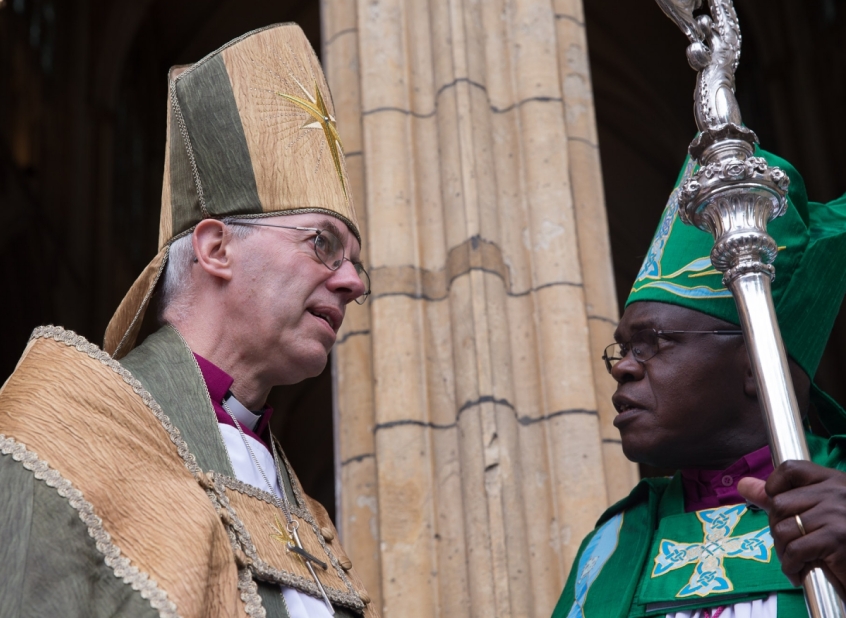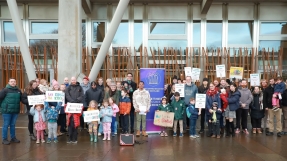
The Archbishop of Canterbury has dismissed claims among Conservative supporting newspapers that the Church of England has shifted to the right as 'absolutely' not the case.
He spoke to Christian Today after he and the Archbishop of York were criticised for a three-page letter sent to all clergy and parishes about the issues in next month's general election.
Archbishops Justin Welby and John Sentamu said in their letter that 'stability' should be one of the key reference points when people were considering how to vote.
It led some to compare it to the 52-page document put out by the Church of England at the time of the last general election, which was widely seen as 'leftwing'.
But in defiant comments in a joint interview with Christian Today and the Guardian, Welby said: 'Was the letter a shift to the right? Absolutely not,' adding that stability had been a watchword of the Christian faith for centuries, and it should not be ceded to a political campaign.
Welby pointed to the voting pattern of bishops on a range of issues in the House of Lords and said of the letter: '[We] spoke very clearly about refugees; about the issues around housing; health, particularly mental health but also public health... the catastrophic gap in life expectancy between rich and poor.'
The letter's release at the weekend prompted the Daily Mail to enthuse that the church leaders had 'seen the light'.
Subsequently, dozens of clergy and other church leaders have signed an 'open response' accusing the Archbishops of a 'deeply troubling' lean towards Theresa May's Conservatives.
Welby however defended the letter and reclaimed the word 'stability' for Christians. He said: 'Just because in a political campaign various words get bandied around, I don't think Christians should give up and say we don't have the copyright of the word any longer. We do, and stability's ours, thank you.'
Of claims that 'stability' is merely a political word, he said: 'That's a bit like the [David Cameron's] "Big Society". Well, Christians were doing the idea of the big society umpteen centuries ago. [St] Benedict started the idea of stability which means within the Benedictine concept of stability is the capacity to cope with rapid change without the devaluation of the human being, with determination and resilience [and] sustainability is so far as the environment and other things.
'And you know God is about stability – that's at the heart of stability – as Benedict says, of the God who is utterly faithful, who enables human life to be sustained.'
He added: 'Christian faith doesn't fit onto a left-right spectrum. You can pick bits out and say 'oh, that's very right-wing,' you can go to the next bit and say 'oh, they're a bunch of trendy lefties' and you keep going to and fro. We're not on the same axis.'
In last year's Brexit referendum, Welby publicly stated he would vote Remain in a move which attracted criticism. 'I think it would have been dishonest not to [make view clear for Remain],' he said.
'I'd written a piece [for the Mail on Sunday] about how we thought how we think about how we vote, and I thought not to say – and I did it in one sentence at the end very carefully saying this is not a suggestion, let alone some kind of unbelievably absurd instruction – I just thought it would be dishonest to have written that and not say which way I was going. It would just seem to me to be untransparent, because your first question would have been "so which way are you going to vote?" and you begin to sound like some of the people you interview who say 'it's entirely hypothetical' or whatever. I just thought it was more honest.'
He added: 'But you know, one of the ways in which the church works is to serve the community whatever it is, wherever it's happening, however it's happening, and we do that in 15,000 parishes every day of the year and we will continue to do that. We do that, educating a million children, and we will try and educate them as best we can, as we always do, as openly and wonderfully as we can and we do a superb job both in our parishes and in our schools, and we'll go on doing that, regardless of Brexit. And we'll make a success – we're part of the process of Britain making a success of its future.'













